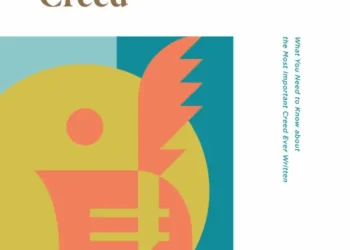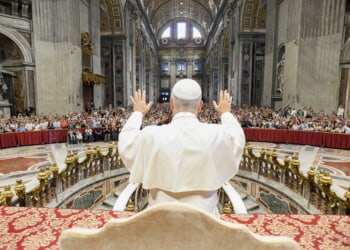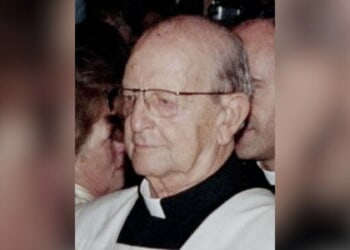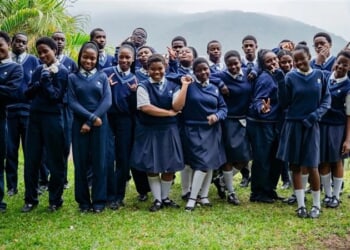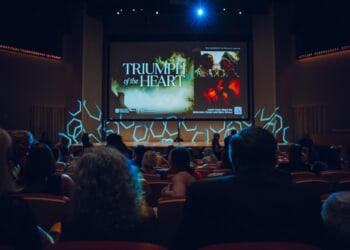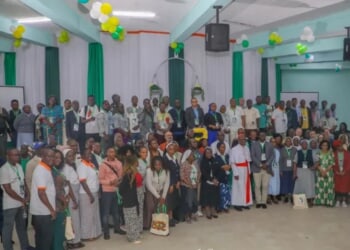Washington, D.C. Newsroom, Sep 16, 2025 /
08:20 am
Exactly one week before the assassination of Turning Point USA Founder Charlie Kirk, CNA interviewed Heritage Foundation President Kevin Roberts for its new “CNA Newsmaker Interview” series, which will feature periodic in-depth interviews with Catholic leaders in diverse fields.
In the wake of the attack, Roberts wrote in a social media post that “we must never, never, never, never, never, never stop fighting to build the America that [Charlie Kirk] helped make possible.”
Kirk, he said, “restored optimism about the American future for millions of Americans.”
This same optimism for the future of America, alongside an equally shared passion with Kirk for the restoration of family life across the country, is central to Roberts’ work at Heritage.
America, according to Roberts, has “arrived at that moment” where it has reached “an understanding in the broader culture that there is something greater than ourselves that defines us as Americans.”
Roberts credited many Catholic leaders in Washington, including Ethics and Public Policy Center President Ryan Anderson, for contributing to the country’s arrival to this moment.
These leaders, Roberts told CNA, “are firm about what they believe. They’re cheerful. They remember the big picture. And when there are times for disagreement, sometimes with major elected officials in our country, they’re temporary, they’re private, they’re virtuous, and they map to not just the right end in this life but the right end of the next moment.”
America’s No. 1 challenge
In a Sept. 12 address to the nation, Erika Kirk emphasized her late husband’s devotion to revitalizing the family, telling those watching: “Charlie always said that if he ever ran for office … his top priority would be to revive the American family.”
In his own book, “Dawn’s Early Light: Taking Back Washington to Save America,” Roberts expressed the same conviction: “The No. 1 challenge Americans face in the 21st century is the crisis of family formation.”
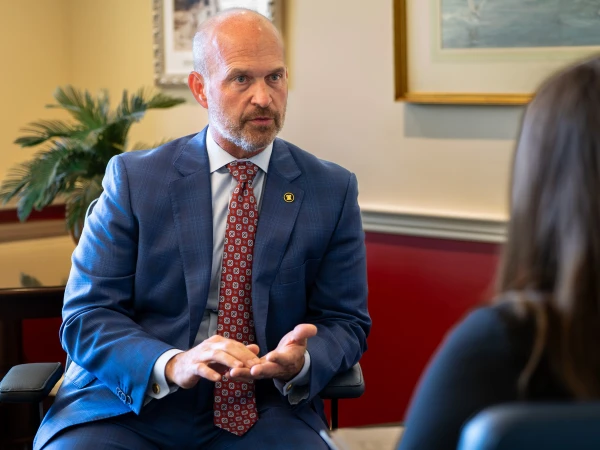
Ultimately, family policy is upstream of most Heritage Foundation policy efforts and is what Roberts considers the focal point of the new conservative movement — which he told CNA “refers to a shift in tactics and composition of American conservatism” rather than a shift in principles.
While the old conservative movement tended to primarily revolve around economic issues, he observed, the new conservative movement recognizes “that goods like the free market flow out of more important things: family [and] a healthy civil society.”
“It’s a real emphasis on those institutions in life that are upstream of what the conservative movement for a generation was fixated on,” he said.
One of the more controversial family life issues Heritage Foundation scholars have worked with the administration on is in vitro fertilization (IVF). The Catholic Church teaches that IVF is unacceptable due to ethical concerns surrounding the practice, including the millions of human embryos killed through the procedure.
“We have a lot of private conversations with a lot of elected officials in this country and others about these issues,” Roberts said regarding IVF. “We’ve seen some real improvement in the rhetoric from the administration, and we look forward to seeing even more.”
(Story continues below)
Subscribe to our daily newsletter
“We’re grateful for what we’ve seen and also have reason to believe that in terms of substance, in terms of policy from the administration, that they are doing a good job of balancing all the competing interests” in the country, he continued, noting that the administration is “trying to keep together a governing coalition” on the sensitive topic.
An educator at heart
Before Roberts entered the public policy sphere, which included his previous leadership of the nation’s largest state-based think tank, the Texas Public Policy Foundation, Roberts enjoyed a successful career in education. First, as a tenure-track college history professor and founding headmaster of a K–12 Catholic school in Louisiana, followed by the presidency of Wyoming Catholic College, where under his leadership, the small institution bucked public funding and was celebrated for its “cowboy-style Catholicism.”
Of all these endeavors, Roberts attributes a key source of his optimistic outlook to the time he spent as headmaster of John Paul the Great Academy in Lafayette, Louisiana. “It wasn’t until going through the arduous journey of keeping a new Catholic K–12 school afloat that I became so optimistic,” he told CNA.
“When I realized six, seven, eight years in that the school was not only going to make it, but it was going to become a model,” he recalled, “I realized that as a conservative, politics and policy are important, but institutions are most important.” Roberts said he believes it will be through these institutions that America will be “revitalized.”
The lifelong educator further observed that “the institutional renewal happening in education is disproportionately classical,” noting that even his doctoral alma mater, the University of Texas, has begun accepting the Classical Learning Test (CLT). “I never thought I would say that,” he mused.
“America’s golden age will be sustained in part because of our politics and in part because of our policy,” Roberts continued, “but most of all because of good decisions that Americans are making,” including by “sending their kids to classical schools.”
Faith in the public square
According to Roberts, who leads one of the most influential think tanks in the nation’s capital, there is no conflict between being fully Catholic and fully American — two aspects, which he recalls in his book, that were also never in conflict for his Cajun forebears in his native Louisiana.
Known for spearheading the Heritage Foundation’s presidential transition initiative Project 2025, Roberts has been accused by some of aiming to impose Christian nationalism on the U.S. — an assertion Roberts said is “100% ignorant understanding of Church teaching.”
“We are free people,” he said of his approach to public policy as an American Catholic. “We of course are bound by morality, an understanding of morality not just from Scripture but from the magisterium, from the tradition of the Church.” At the same time, this does not prevent Catholics from disagreeing with Church pronouncements on prudential matters, citing his own past disagreements with the energy and environmental policy prescriptions of the late Pope Francis.
“Catholics have total freedom to disagree with the pope when he is not speaking ex cathedra,” he explained.
“As a lay Catholic, I’m totally free to say that Pope Francis spent way too much time engaging in conversations he was ignorant about and should have stayed out of,” Roberts added.
As for Pope Leo XIV, Roberts said he is “optimistic,” citing the Chicago-born pontiff’s choice of name and restoration of several papal traditions as positive signs for the Church at large.
On lesson learned from Project 2025
Reflecting on the controversy around Project 2025, Roberts told CNA it was Heritage’s “moral obligation” as a leading policy center to provide a “menu of options that ultimately the president would choose to select or not.”
“The lesson we’ve learned — and the buck stops on my desk — is we’ll never, ever let the American left define our work for six weeks without responding,” he added.
“They picked a fight, but we finished it. And when they pick it the next time, we’ll finish it twice,” said Roberts, who revealed that work is already underway on updating the project in advance of the 2028 presidential election.
Overcoming childhood adversity
Though a cradle Catholic, Roberts’ faith “became unshakable,” according to his book, amid extreme adversity in his family life at a very early age. Roberts had experienced the divorce of his parents at age 4 and the death of his older brother by suicide when he was just 9.
“The only way to overcome all of the disadvantages of divorce, including spiritual, economic, educational, etc., is to know and love Jesus Christ,” he told CNA. For Catholics, he said, that means staying “very close to the sacraments,” including regular Mass attendance, praying the rosary, and frequent confession.
In addition, Roberts advised children of divorced parents “to not allow the decisions and behaviors of our respective parents to get in the way of recognizing that we are called to a vocation.”
“Always, every day, operate in forgiveness, not just toward our family members, our parents, but to everyone we interact with,” he continued. “Don’t hold grudges. Don’t have a chip on your shoulder. Be cheerful, because not only are we Christians, but we’re Americans. We have no reason to be pessimistic.”
What does ‘America first’ mean?
Apart from its re-centering on family life issues, Roberts also defined the new conservative movement as a “real corrective” to neoconservative interventionism in national security and foreign policy.
“The American people understand that we’re too much in debt,” he pointed out. “We have too many domestic problems to be engaged in all these far-flung, never-ending wars.”
While America must maintain its status as having the most lethal military in the world, Roberts indicated, “the new conservative movement understands that we, in fact, do worry about Americans first.”
For Roberts, this same principle applies to immigration policy.
While the country’s bishops advocate legalization for millions of people who are currently in the country without legal status, Roberts and the Heritage Foundation maintain a principled no amnesty position.
“They broke the law,” Roberts stated. “Until we correct the breaking of the law, it is a slippery slope… We can’t have the conversation until we correct a much greater injustice. And that is that we have over a hundred municipalities, cities and counties, states that describe themselves as sanctuary cities and counties and states.”
“We not only need to end that,” he continued, “but we need Catholic bishops in those places to say that must be ended, because the continuation of those sanctuary cities prevents ICE and all the interior enforcement from actually focusing on the 268,322 felons we know among the 22 million illegal aliens.”
Renewed attention to America’s cities
Roberts noted the Heritage Foundation’s newest project will focus specifically on revitalizing American cities and local governments that have been “forgotten” by conservatives. “The issue of conservatives initiating urban renewal has not been taken up by anyone,” he pointed out, “so we are.”
Heritage will be hiring a policy scholar and campaign manager, he said, revealing that a separate political arm, Heritage Action, aims to gain a conservative policy foothold in more American cities.
“I look at this as someone who believes that I want any American of any political stripe, religious affiliation, to feel like they can live in an American city,” he concluded. “Because if we fail at that, we have failed at the American project.”






